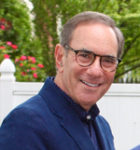
Parasha Naso
By Michael R. Mantell, Ph.D.
SAN DIEGO — In this week’s parasha, Naso, the longest in the Torah, we are introduced to the Birkat Kohanim, the “Priestly Blessing.” We’re all familiar with it. We’ve heard it said, recited it ourselves, and offered it to others, many times:
| “May the Lord bless you and watch over you. | כדיְבָֽרֶכְךָ֥ יְהוָֹ֖ה וְיִשְׁמְרֶֽךָ: | |
| May the Lord cause His countenance to shine to you and favor you. | כהיָאֵ֨ר יְהוָֹ֧ה | פָּנָ֛יו אֵלֶ֖יךָ וִֽיחֻנֶּֽךָּ: | |
| May the Lord raise His countenance toward you and grant you peace.” | כויִשָּׂ֨א יְהוָֹ֤ה | פָּנָיו֙ אֵלֶ֔יךָ וְיָשֵׂ֥ם לְךָ֖ שָׁלֽוֹם: |
And we say, “Baruch shem k’vod malchuto l’olam vaed, “Blessed be the name of God’s glorious kingdom for all eternity.” After all, Hashem is the source of all our blessings.
This may well be one of our oldest prayer texts that we continue to use in contemporary times. For those who look carefully, you’ll see the growing meaning and increasing power in these words and letters. From 3 words, it grows to 5 words, and then to 7 words. It grows from 15 letters to 20 letters, to 25 letters. From being watched over, to the ultimate gift for a healthy life, peace, this b’racha points us to what really matters – especially essential during these chaotic, threatening, stressful times – Divine intervention and earthly benefits. Being blessed in both our spiritual and physical lives is what truly matters.
Perhaps chaos, threat and stress may also be seen as blessings, an indication of Hashem redirecting, not rejecting, or rebuffing our lives. Those with trust and faith see blessings in our times and focus on where peace through this time – and all time – will come from, as we are taught in the Birkat Kohanim. He will grant us peace. Look inside of this prayer and you will reaffirm an important insight, that we live in both a physical and spiritual world. You will see both physical and spiritual benefits seeded within each of the prayer’s lines.
A life of favor, vichuneka, anchored in the word chein or grace, is a different life than one filled with materialism. The b’racha seems to begin with blessings of materialism and then moves beyond that…as we would be wise to do as well.
We learn in in Chapter 3 Mishna 17, “Rabbi Eleazar ben Azaria used to say: Where there is no flour, there is no Torah, and where there is no Torah, there is no food. Our material and spiritual blessings are tools to bring us closer to Hashem. We are provided the opportunity, not always as we’d like it, to balance our flour with our Torah. Perhaps this is the real message of the Priestly Benediction in this week’s Torah reading.
Doing so however, seeing the value in the flow and direction of this message, may take a lifetime to truly, and deeply, understand and embrace. From material success, to acquiring genuine spiritual growth, the wisdom and light of Torah, these words move us to purposeful action, united, as one. Supporting and lifting those who are vulnerable, speaking and acting against injustice, remaining strong and never backing down in the face of “evil,” standing against divisiveness and dissension among all, are indicators that we take the blessings in Naso very seriously. It’s more than reciting words. It’s putting our entire self into serving others and ultimately thereby serving Hashem. We learn in Shemos, 19:6, that we are all to be Mamleches Kohanim, a kingdom of priests, people who are Oheiv shalom v’rodeif shalom, with the desire and ability to seek and build peace, the ultimate gift of Hashem’s blessings.
Shabbat Shalom
*
Michael R. Mantell, Ph.D., prepares a weekly D’var Torah for Young Israel of San Diego, where he and his family are members. They are also active members of Congregation Adat Yeshurun. He may be contacted via michael.mantell@sdjewishworld.com
Ongoing baruchas miracles & blessings to you & your loving family & Am Yisroel Chai!! My dad was a faithful Hagadol Kohanim & I’m endowed with many beautiful memories and blessings.